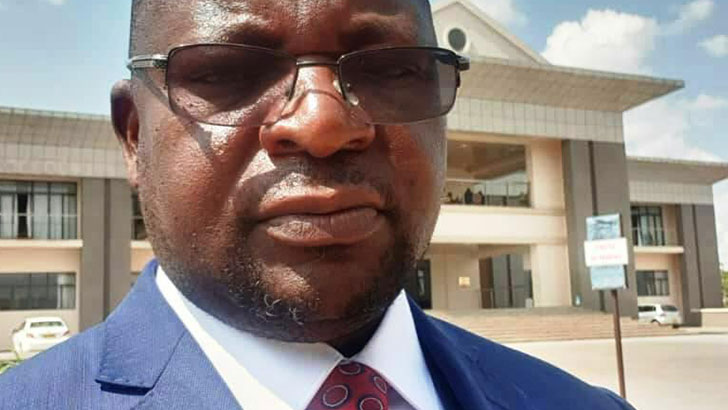DPP battle gets dirtier
Mangochi South West legislator Shadric Namalomba has taken the Democratic Progressive Party (DPP) infighting to a new height with a claim that Leader of Opposition in Parliament Kondwani Nankhumwa abused public funds.
A visibly highly-charged Namalomba, who is also spokesperson for both DPP and its president Peter Mutharika, made the allegation in Parliament in Lilongwe yesterday.
His reaction followed an order by Speaker of Parliament Catherine Gotani Hara for him to move from the front benches to the back seat following a new seating arrangement submitted by Nankhumwa.

Nankhumwa had brought to the attention of the Speaker that Namalomba was occupying his old seat in defiance of the new arrangement.
But in response, Namalomba said he was empowered by a court order he obtained on Wednesday putting aside Nankhumwa’s decisions pending a judicial review.
He said: “The Judiciary has granted me relief. As you are aware, I also wrote to you [the Speaker] that I do not see from afar and I put this in writing, just as I did to my leadership.
“When I approached you, you said I should go back to my party. I went to my party, but things did not work out. Today, Madam Speaker, I am here not because of the Leader of Opposition, I am here because of the court.”
But the Speaker said her office was yet to be formally served with the court order in question. She said electronically forwarding the order to her office was not the set procedure for legal documents.
Namalomba obliged to the Speaker’s reasoning, but turned personal on Nankhumwa in terms of both body language and his voice.
Pointing his finger at Nankhumwa, he said: “If this is the way we are going to run Parliament, I don’t want that.
“I was chairperson for the Public Accounts Committee and he [Nankhumwa] stole money. That is why he is doing all this to me.”
Namalomba said if DPP did not want him, he was ready to move out as there were other people who appreciated his contributions. Although he did not make specific mention, his statement stirred euphoria from the government benches.
As Namalomba reluctantly moved to his newly allocated seat behind the DPP benches, Ntcheu West legislator Simeon Salambula (UTM Party) asked the Speaker if the court order Namalomba obtained had any consequences, bearing in mind that members of Parliament (MPs) enjoy privileges and immunities during meetings.
He was apparently referring to Section 60 of the Constitution which states that the Speaker, Deputy Speaker and MPs shall, except in cases of treason, be privileged from arrest while going to, returning from or while in the precincts of the National Assembly and shall not, in respect of any utterances that forms part of the proceedings in the National Assembly, be amenable to any other action or proceedings in any court, tribunal or body other than Parliament.
In her response, the Speaker said the House could only be served with an injunction during sitting through the office of the Attorney General “if at all we are to be served with an injunction”.
Nankhumwa, on the other hand, held the view that Parliament has immunity on such court decisions during its meetings.
In an interview, former Speaker of Parliament, Louis Chimango, a lawyer, said that during the sitting of Parliament the Speaker or an MP should not be served with any court orders.
Drawing from his own experience as Speaker, he said he used to refuse to be served with court orders to avoid compromising his role and that of the National Assembly.
Chimango said: “Can you serve it on the Speaker while the House is in session? My view is you do not do that and don’t do it. Don’t serve it on the Speaker because that is not right because that is another arm of government doing its part. In fact, during my time I refused to be served. If someone tried to do it, I refused.”
But private-practice lawyer John Gift Mwakhwawa, who also teaches law at Catholic University of Malawi, said the constitutional privileges are limited to criminal matters. Thus, he said orders on civil matters can be served on the National Assembly any time.
He said: “It must be understood that the immunity and privilege does not extend to the institution or office of the Speaker, but parliamentarians. This means you can take Parliament or the office of the Speaker to court anytime.
“Secondly, Section 60 [of the Constitution] talks about immunity from criminal matters except treason. The matter in question is a civil case. So the court order in question has consequence.”
Later in the afternoon, Namalomba confirmed that he had served the Attorney General with the court order.
Attorney General Thabo Chakaka Nyirenda confirmed being served with the injunction.
Infighting in DPP started before the court-sanctioned Fresh Presidential Election held on June 23 2020, but deep divisions came to light in August 2020 when the party’s secretary general Grezelder Jeffrey told The Nation that Mutharika had done his part and that there was need for new leadership.
Mutharika took over leadership of the party after the death of his brother Bingu wa Mutharika in April 2012, propelling the party to victory in the 2014 elections.





